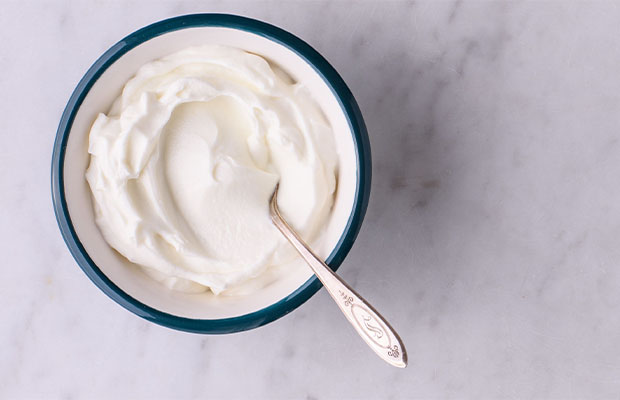Are you unsure whether to consume a tub of sour cream that has been sitting in the refrigerator for some time? Here’s how to tell.
How long is sour cream good to eat? Sour cream stays fresh for up to two weeks after opening the container and for one to two weeks after its expiration date. All cream-related products likely have a shelf life longer than that.
However, you must properly store sour cream if you want it to last as long as possible. Once the container has been opened, that is especially true.
In this article, we go through storage, shelf life, freezing and going bad of this dairy product.
Table of Contents
How Long Does Sour Cream Last?
Cow’s milk cream that has undergone a similar fermentation process to yogurt and has been combined with lactic acid bacteria to produce artificial souring is sour cream. It tastes a little sour, but it hasn’t really gone bad.
Either a sell-by, best-by, or use-by date is printed on your sour cream. Even though it can last past the first two dates, the USDA strongly advises against consuming sour cream after it has passed its use-by date.
The shelf life of regular and reduced fat sour cream is the same.
- Unopened – If kept in the refrigerator, sour cream can remain fresh for up to three weeks after its expiration date, but make sure to thoroughly inspect it before using it.
- Opened – If properly stored after opening, sour cream can last for seven to ten days.
These guidelines only apply to sour cream that has been routinely kept in the refrigerator. Bacteria will quickly multiply if exposed to room temperature in just a few hours.
What Will Cause Sour Cream Spoiling?
Milk that has been pasteurized to kill the majority of harmful bacteria is used to make sour cream. Healthy bacteria then ferment it, resulting in the production of lactic acid, which gives it its sour flavor. While homemade sour cream might introduce a wild card of other bacteria types, commercially produced sour cream must abide by safety standards. Since the live components in sour cream were not destroyed by sterile canning procedures, think of sour cream as a living product.
Bacteria And Molds In Sour Cream
The milk’s protein and sugars serve as a happy culture medium for both a variety of unfavorable bacteria and molds that could spread disease as well as the friendly sour-producing bacteria. If you leave your sour cream out at room temperature for any period of time, it may grow even more quickly. They might do this over the course of weeks when kept in the refrigerator. When using your sour cream, you might unintentionally introduce more bacteria and mold because of air exposure or by using an unclean spoon.

Signs Of Sour Cream Spoilage
Even if your sour cream is still within its “use by” or “best by” dates, don’t consume it if you see:
- An Off Smell: Give your sour cream a whiff. It probably has additional growth in it that will affect the flavor and safety if it smells moldy, rancid, or stinky in any other way than the typical sour smell.
- Mold: The entire container must be thrown out if mold is visible on the surface. Don’t give in to the urge to simply remove the mold and then consume the remaining food. You might not be able to see the full extent of the mold with the naked eye.
- Sour cream that is yellow or tainted The presence of noticeable bacteria and fungi growth is clearly indicated if the cream has lost its white color.
If foods aren’t handled properly, their shelf life may be significantly shortened. Whether it was the producer, a vendor, or a resident of your house, your sour cream may have occasionally been left out at room temperature. Or perhaps someone inserted a soiled spoon into the container. When your nose and eyes warn you that something is off, believe them.
What Will Happen If You Eat Bad Sour Cream?
As we’ve already mentioned, mold and a wide variety of bacteria love the sour cream environment. Even in the refrigerator, these nasties can multiply.
Food poisoning, which can be mild or severe depending on a variety of factors, is a possibility if you consume poor sour cream.
If you have food poisoning, you might experience fever, diarrhea, nausea, and stomach pain. After consuming poor sour cream, it might start to show up right away or after a few days.
Can Sour Cream Be Freezed?
The majority of manufacturers advise against freezing sour cream. Like buttermilk and many other dairy products, sour cream separates once thawed.
Even though gently whipping it will help you restore some of the consistency, the outcome won’t compare to using fresh sour cream.
As a result, only cooked and baked dishes can be frozen using sour cream.
Sour cream’s altered texture won’t have a significant impact on a dish like soup because you will stir the dairy product in regardless of how you add it. similar to using thawed sour cream in baking.
Consider using an ice cube tray when learning how to freeze sour cream. This way you can easily thaw as much or as little as you need. In addition, rather than being placed in an airtight container, the frozen cubes are placed in a freezer bag, which requires much less room in the freezer.
Of course, you can use a freezer-safe jar or container if you don’t want to bother with using a tray. Just keep in mind to leave an inch of headspace because when sour cream is frozen, it slightly expands.
How Should We Store Sour Cream?
Like other dairy products such as heavy cream or half and half, sour cream needs to be refrigerated. And while keeping sour cream on the door shelves is common, it’s not the best option.
There isn’t a good response to questions like this one I’ve seen online about how long sour cream can be left out of the fridge. In other words, you should put it in the fridge as soon as you can after buying.
Once you open the container, make sure it’s always sealed tightly. If it is difficult to seal, think about pouring the sour cream into a mason jar or another airtight container.
If you plan to keep it in the fridge for at least a few days, that is especially helpful. In addition to preventing drying out and strong odors, a tight seal also keeps them contained.
Since in most cases we don’t use the whole container of sour cream right away, it’s essential to practice proper food hygiene.
That means you should always use clean utensils when scooping sour cream and never double-dip. Simply take out a clean spoon or wash the used one if you ever need an extra teaspoon or two for a recipe.
Read Next: How Long Does CornMeal Last?

